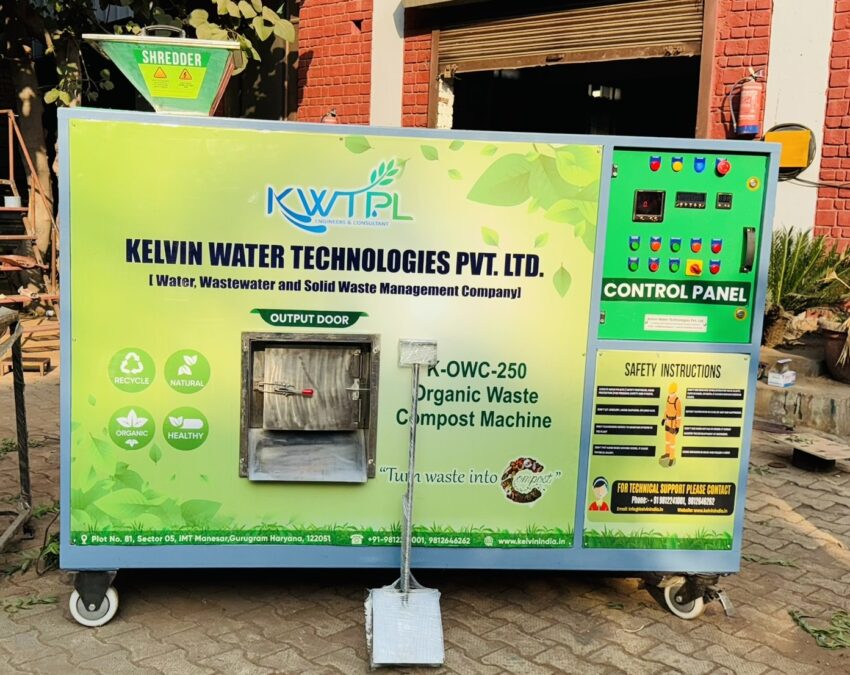Waste management is a vital aspect of modern society, directly impacting the environment, human health, and the sustainability of our resources. With urbanization, industrial growth, and rising consumerism, the volume of waste generated globally has reached alarming levels. Effective waste management systems are essential to handle, process, and dispose of this waste in ways that are environmentally responsible and economically viable.
This comprehensive guide explores the concept of waste management, its types, methods, importance, challenges, and the role of companies like Kelvin Water Technologies Pvt. Ltd. in revolutionizing waste solutions in India.
What is Waste Management?
Waste management refers to the collection, transportation, treatment, recycling, and disposal of waste materials in a way that reduces their impact on health and the environment. It involves the management of waste from its inception to its final disposal, including monitoring, regulation, and compliance.
Waste can originate from various sources:
- Residential (household waste)
- Commercial (offices, restaurants, shopping centers)
- Industrial (factories, manufacturing units)
- Agricultural (farm waste, crop residue)
- Medical (hospitals, clinics)
- Construction and Demolition (C&D waste)
Types of Waste
Understanding different waste categories helps in determining the appropriate management approach:
- Municipal Solid Waste (MSW):
Everyday waste from households and public places like food scraps, paper, plastics, and packaging. - Industrial Waste:
Generated during manufacturing processes—includes chemicals, metals, and non-biodegradable materials. - Hazardous Waste:
Contains harmful properties such as toxicity, flammability, or corrosiveness—common in chemical plants and hospitals. - E-waste (Electronic Waste):
Discarded electronic appliances such as computers, phones, and TVs. - Biomedical Waste:
Waste produced in healthcare facilities, including syringes, gloves, and pharmaceuticals. - Organic Waste:
Decomposable waste like kitchen scraps, garden trimmings, and agricultural residue.
Key Methods of Waste Management
- Source Reduction and Waste Minimization
Reducing waste at its origin is the most effective strategy. This includes using fewer materials in manufacturing and encouraging consumers to adopt sustainable habits like reusable bags and containers.
- Recycling and Reuse
Recyclable materials like paper, plastic, glass, and metals are collected, processed, and turned into new products. Reuse involves repurposing items without processing.
- Composting
Composting is the natural decomposition of organic waste into nutrient-rich soil. It is a sustainable solution for food and garden waste.
- Incineration
Burning waste at high temperatures reduces its volume and sometimes produces energy. However, it must be controlled to prevent air pollution.
- Landfilling
Non-recyclable and non-hazardous waste is buried in landfills. Modern landfills are engineered with liners and drainage systems to prevent contamination.
- Waste-to-Energy (WTE)
Converting waste into energy through combustion or other processes. It helps reduce reliance on fossil fuels and manages waste simultaneously.
Why is Waste Management Important?
- Environmental Protection
Proper waste management reduces pollution, conserves natural resources, and mitigates greenhouse gas emissions. - Public Health and Safety
Improper waste disposal can spread diseases, contaminate water sources, and create breeding grounds for pests. - Resource Recovery
Materials like paper, metals, and plastics can be recovered and reintroduced into production cycles, conserving resources. - Economic Benefits
Waste management creates jobs in recycling, transportation, treatment, and energy sectors. - Regulatory Compliance
Governments worldwide have strict waste disposal laws. Efficient systems ensure businesses meet these legal requirements.
Kelvin Water Technologies Pvt. Ltd.: Empowering Smart Waste Solutions
Kelvin Water Technologies Pvt. Ltd., a leading environmental solution provider in India, plays a pivotal role in advancing waste management through innovation and reliable technologies. With a commitment to sustainable development, Kelvin offers a wide range of waste management equipment and services that cater to industries, municipalities, and residential complexes.
Key Solutions Offered by Kelvin:
- Organic Waste Composters for decentralized food and kitchen waste treatment.
- In-Vessel Composting Systems for large-scale organic waste management.
- Baling Press Machines for compacting recyclable materials.
- Biomedical Waste Sterilizers for safe disposal of medical waste.
- Sewage & Effluent Treatment Plants (STP/ETP) for water reclamation.
- Waste Segregation Systems to streamline processing and recovery.
Why Choose Kelvin Water Technologies?
- ✔ Tailored Solutions: Custom-designed equipment to meet client-specific waste volumes and types.
- ✔ Eco-Friendly Design: Machines built to minimize environmental impact.
- ✔ Quality Assurance: Robust construction and reliable performance.
- ✔ After-Sales Support: Installation, training, and AMC services ensure smooth operation.
- ✔ Compliance-Oriented: Equipment and practices meet all major national environmental regulations.
Innovative Trends in Waste Management
- Smart Waste Bins: IoT-enabled bins alert waste collectors when they are full.
- Automation and AI: Robots and AI software for sorting recyclables and optimizing routes.
- Circular Economy Models: Focus on reusing and regenerating products and materials.
- Plastic Alternatives: Biodegradable packaging to reduce plastic waste.
- Community Involvement: Educational campaigns to promote segregation and recycling.
Best Practices for Effective Waste Management
- Segregate waste at the source. Separate biodegradable, recyclable, and hazardous waste.
- Promote recycling and reuse. Encourage recycling at the community and corporate levels.
- Adopt composting. Convert kitchen and garden waste into useful compost.
- Support local recycling initiatives. Engage with NGOs and recyclers for proper disposal.
- Invest in proper waste bins and storage. Ensure color-coded bins are accessible.
- Choose reliable technology partners like Kelvin Water Technologies.
Conclusion
Waste management is not just an operational need—it is a responsibility that affects our environment, health, and future. From reducing landfill use to enabling resource recovery and clean energy production, modern waste management strategies are transforming how we interact with waste.
Organizations like Kelvin Water Technologies Pvt. Ltd. are at the forefront of this transformation, providing cutting-edge solutions that help communities and industries manage their waste more efficiently and sustainably. By combining innovation, awareness, and responsibility, we can all contribute to building a cleaner, greener planet.

